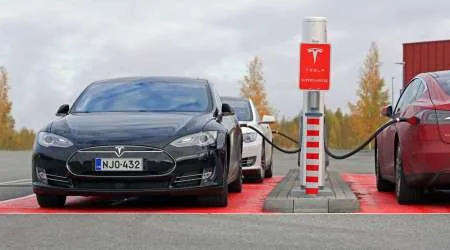Have we got the power?
As an electric car, the Tesla relies on being able to find "Supercharger" stations to ensure you have enough power to complete long-distance journeys. The map below shows where you can find those charging stations across Australia as of April 2016, including Tesla's own Superchargers, "patron" sites such as hotels and resorts which only allow charging for visitors, and Airbnb locations with dedicated chargers. Right now, 22% of Australia's area is covered.
Key facts to know about your Tesla:
- According to Tesla, charging between 10% to 80% at a Supercharger will provide you with enough charge to travel to another Supercharger on the network.
- You’ll need 75 minutes to get a Tesla S to full charge using a Supercharger but only 40 minutes for 80% charge
- After charging at a Tesla Supercharger for half an hour, you can can travel 270km.
- 320,000 reservations have been made for the Tesla 3 globally.
New cars are introduced to the public every day, but when the Tesla Model 3 was released it was different. That's because there is nothing normal about Tesla.
Heath Walker, senior marketing and communication manager at Tesla, explained to us how the company is prioritising the Supercharger rollout. "We want to connect major cities based on sales and where we are operational and then branch from there. We are also putting in place a Destination Charging program where hotels, shopping centres, airports and secure parking locations receive high power wall connectors for charging of the Model S," he said.In the US, the Supercharger network is much more advanced, which Walker says is due to a few key factors.
"The US has built infrastructure as the population of vehicles have been adopted. In addition, they launched the Model S in 2012. This being said, 90-95% of charging is done at home, and Superchargers are for long-distance travel which we have enabled in the two major cities where we are operational."

Tesla aims to "cover Australia in superchargers," according to Walker, which he said should not stop anyone from purchasing a Tesla within 500km of range of the Supercharger network.
Range anxiety, or the fear of losing charge and being nowhere near a charger, is an issue often discussed by Australian Tesla enthusiasts. Tesla's focus has been on the east coast, with all major cities planned to be connected this year. However, the next phase of its plan, which may or may not involve the introduction of more Superchargers on the west coast of Australia, is yet to be announced.
While range anxiety is very real, Walker says the solution is about changing behaviour.
"Range anxiety was introduced by petrol vehicles. Every time the red light comes on in a vehicle, that is range anxiety. Owning an electric car is like owning a mobile phone, you get home, charge, and wake up with the equivalent of a full tank of petrol every morning. And nobody fills up twice in a day unless driving long distances, which is where Superchargers come into play."
Superchargers provide 270km of range with 30 minutes of charging time. Based on a Model S, you would need to charge for 75 minutes to get the car to full battery, but Tesla estimates only 10-80% of charge is needed to travel between most Supercharger locations.
Finder survey: Would Australians in different states consider a green car loan to buy an EV?
| Response | WA | VIC | SA | QLD | NSW |
|---|---|---|---|---|---|
| No | 55.93% | 63.82% | 62.67% | 61.9% | 56.98% |
| Yes | 44.07% | 36.18% | 37.33% | 38.1% | 43.02% |
Data for ACT, NT, TAS not shown due to insufficient sample size. Some other states may also be excluded for this reason.
Popular searches on Finder
Popular car loans
Other searches on Finder
Picture: Taina Sohlman / Shutterstock.com
More guides on Finder
-
Car loans for pensioners
On a pension but need a new car? There are still many choices if you know where to look.
-
Compare car loans for classic cars
Want to buy a classic car but don't have the ready money? There are still financing options available for classic vehicles. Find out what loans you have to choose one and which one will work best for you.
-
Car loans for casual workers
You can still get a car loan even if you work casually, and there's a range of loans for you to choose from. Find out here how you can get finance for your next car and which loan might be best for you.
-
Quick car loans
You don't need to wait to get car financing. Some lenders can approve you instantly and send your funds on the same day. You can also consider pre-approval. Find out all the ways to get a quick car loan in this guide.
-
How long will it take for your car loan to be approved?
Read our guide to the approval times for popular lenders and how the application process works.
-
Can you pay off your car loan early?
Repaying your car loan early can save you money, but some lenders impose restrictions and charge additional fees.
-
Compare car loans for students
Ready to get behind the wheel of your own car? Find out how you can get a loan as a student.
-
How to find the best caravan loan in Australia
Don't buy a new caravan until you've read this guide. Find out exactly what financing options are available and how to compare your caravan loan options to find the right loan for you.
-
Used car loan rates Australia
You can still get a car loan if you want to finance a used car. Find out how you can get a used car loan and see what rates are available for the used car you want. Learn how to best compare lenders and apply for your loan today.

